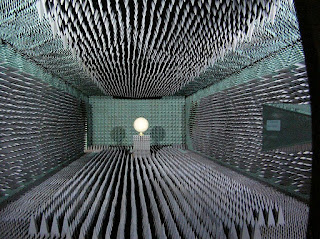Ear Training - First of all Steps of Becoming a Sound Engineer
Training your ear in the field of sound engineering is an important aspect. It helps us realise the hidden abilities of our ears. The ears of a sound engineer have to be different than that of an ordinary listener. He/She should be able to differentiate between the high frequencies and the low frequencies, speciality of speakers, headphones, and microphones.
Here are some keywords and terms, related to ear training, which may help beginners like me venture out in the vast field of sound engineering: -
Anechoic chamber: -
An anechoic chamber is a chamber which is completely sound absorbent and there is no chance of sound escaping through the room or the chamber. As its name reflects, it is completely non echoic or an - echoic.
Aural domain: -
The domain of hearing and sensing of different sounds
 Impulsive sounds: -
Impulsive sounds: -
Sounds which are sharp in nature. The sounds are mostly unwanted in the field of audio engineering. Example of these sounds are clicks and pops.
Reverberation: -
 When a sound gradually decays over time, and you get to hear that sound from a long distance, is known as a reverberation. You will notice that the sound comes from all the possible directions in the room or hall.
When a sound gradually decays over time, and you get to hear that sound from a long distance, is known as a reverberation. You will notice that the sound comes from all the possible directions in the room or hall.
Comb Filtering: -
That's it for today folks, will continue tomorrow! Have a great time!
Here are some keywords and terms, related to ear training, which may help beginners like me venture out in the vast field of sound engineering: -
Anechoic chamber: -
An anechoic chamber is a chamber which is completely sound absorbent and there is no chance of sound escaping through the room or the chamber. As its name reflects, it is completely non echoic or an - echoic.
Aural domain: -
The domain of hearing and sensing of different sounds

Sounds which are sharp in nature. The sounds are mostly unwanted in the field of audio engineering. Example of these sounds are clicks and pops.
Reverberation: -

Comb Filtering: -
The small difference in time of arrival and
near-equal amplitude of direct and reflected sound at the
ears of a listener creates a change in the frequency content
of the sound that is heard, due to a filtering of the sound
known as comb filtering.
Spectral Balance: -
The human ear has a spectrum of 20hz to 20khz of audio listenability. To create the balance between the spectrum is known as spectral balance. The audio or sound engineer always longs for spectral balance in his mixes and goes to great lengths finding the optimal sounding balance of his mix. He then plays or experiments with several plugin effects (hardware or internal) to find the best spectral balance that suits his ears.
Spectral Balance: -
The human ear has a spectrum of 20hz to 20khz of audio listenability. To create the balance between the spectrum is known as spectral balance. The audio or sound engineer always longs for spectral balance in his mixes and goes to great lengths finding the optimal sounding balance of his mix. He then plays or experiments with several plugin effects (hardware or internal) to find the best spectral balance that suits his ears.
That's it for today folks, will continue tomorrow! Have a great time!


Comments
Post a Comment